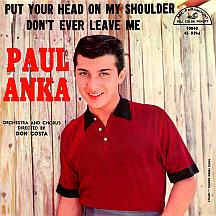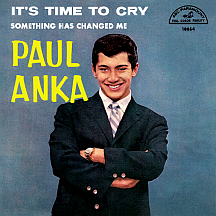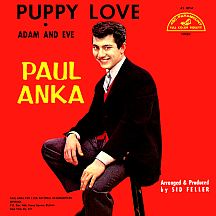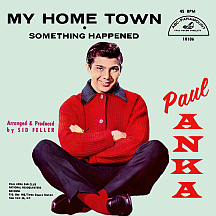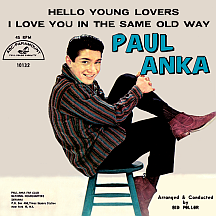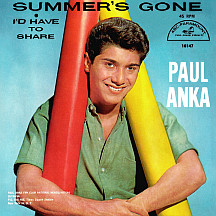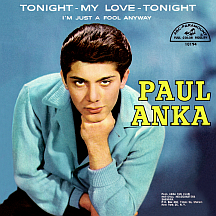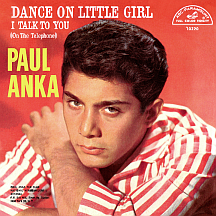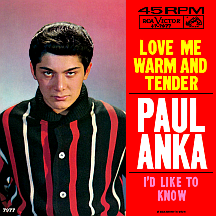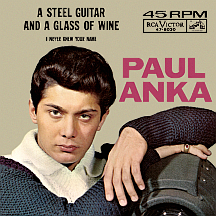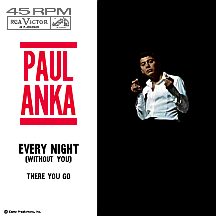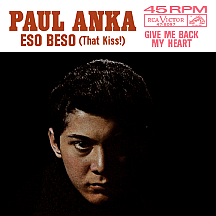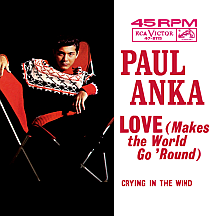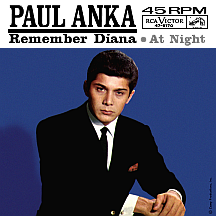PAUL ANKA
There's no telling how many budding entertainers have crossed Canada's southern border seeking fame and fortune beyond their native land, though the rate of acceptance was limited in the first seven or eight decades of the 20th century. Guy Lombardo fared best in the U.S. starting in the mid-1920s; he and his Royal Canadians had several dozen top-selling hits in the 1940s alone. One very young singer named Paul Anka was by far the most successful Canadian music artist of the '50s and '60s rock and roll era, his only serious competition coming from Toronto's Four Lads and Crew-Cuts, and then only for a couple of years. Anka was extremely ambitious; he performed in public in his home town, Ottawa, Ontario (where his father owned an Italian restaurant across the street from the House of Parliament) and won a talent contest a year later in Gloucester, Massachusetts (entered as a lark while on vacation with his parents), doing a satirical imitation of then-current singing star Johnnie Ray.
The hook was in deep; any career goals were superseded by a persistent desire to write songs and perform them for whoever would listen. In 1956, while attending Fisher Park High School, he formed a group, The Bobby Soxers, with Ray Carrier and Jerry Barbeau, then spent the summer in Los Angeles with his uncle, landing a job at a theater working as an usher/concession stand/car parking go-getter. He wrote some songs, those early efforts (such as "Don't Gamble With Love") containing quite a bit of lyrical repetition ('don't gamble!'), though a flair for melody quickly surfaced. He decided to approach some of the local record companies and started with Modern Records, despite its being primarily an R&B label (he liked "Stranded in the Jungle," a hit at the time for The Cadets). A&R head Ernie Freeman was friendly and receptive to Paul's ideas, so on a hunch he put him into the studio - with the Cadets! - and out came a ballad, "I Confess," plus Paul's rocking uptempo composition with an unusual title, "Blau-Wile-Deveest-Fontaine." He returned to Ottawa at the end of summer excited about his impending stardom.
The single, released in the fall of 1956 on Modern's RPM subsidiary, didn't catch on. Paul was a 15-year-old failure...or was it perhaps just the beginning? He developed a crush on Diana Ayoub, an "older woman" of 18 who sometimes babysat his younger siblings Miriam and Andrew. A song took shape, though he had a problem filling some of the gaps in the lyrics and went with 'Oh-oh...oh-oh...oh-oh-oh-oh-oh-oh-oh-oh-oh-only you-uh can-uh take my heart...' (clever, whether on purpose or by accident). Anyway, it hardly seemed like the kind of thing that might become an early rock and roll classic. When '57's spring break rolled around, he borrowed a hundred dollars from family members and headed for New York City, where he stayed with The Rover Boys (having met them when they performed in Ottawa), sleeping in the bathtub in their hotel suite before dropping by unsolicited at the group's label, ABC-Paramount. Staff producer Don Costa, well aware of the rising teen trend, figured this brash 16-year-old's songs about youthful distractions like yearning for girls he didn't stand a chance with was perfect for the genre...so he gave him a shot...and it didn't hurt that Paul had already made a record.
After some coaching, Costa produced "Diana" and "Don't Gamble With Love." Anka's sound was rough around the edges, just the right amount of naiveté to make it appealing. It caught on immediately. Even the real Diana was suddenly interested in going out with Paul...only now she had to stand in line! The song she'd inspired hit number one in September '57 and multiple-record-store owner Irvin Feld booked Paul on an extensive "Greatest Show of Stars" tour that started immediately and ran through November. Meanwhile, Paul's parents sold the restaurant in Ottawa, moved to New Jersey and bought a house...this based on their eleventh-grader son having a million-selling hit!
He recorded "What You've Done to Me," a duet with singer-model Micki Marlo (who'd had a minor hit, "Little by Little," earlier in the year), billed as a "Vocal Assist by Paul Anka." The song, structurally very similar to Micki's hit, failed to connect and was quickly forgotten by all but Anka's most dedicated fans. His solo follow-up, "I Love You, Baby" (the first of four A sides penned by Paul), had the elements necessary to be a hit but barely charted...was it too late for the family to move back to Ottawa and resume life as restaurateurs? The answer came with the next single, "You Are My Destiny" ('...that's what you are!'), a big orchestra production (not at all like "Diana") that reached the top ten in February 1958 and established a valid direction for the future: crooning, the more melodramatic the better! Paul had proven he could pull it off!
"Crazy Love" combined the orchestra sound with a demented teen sensibility and peaked in the top 20. "Midnight" and "Just Young" (the latter covering a song composed by the mysterious Lya S. Roberts and recorded by Andy Rose, whose version outperformed Paul's) had less luck. ABC-Paramount was in the business of selling records and not above promoting its stars by any means necessary, thus a gimmicky teaming of Anka with the label's other young male vocalists, George Hamilton IV and Johnny Nash, resulted in the spoken "Teen Commandments," a rewrite of the original decree (George: 'Don't let your parents down...they brought you up,' Johnny: 'Choose a date who would make a good mate,' Paul: 'At the first moment, turn away from unclean thinking...AT THE FIRST MOMENT!') with the biblical commandments all lumped together as the tenth. A top 40 hit in December 1958!
Paul fared well with a couple of vintage standards in early 1959. The first, "(All of a Sudden) My Heart Sings," had been made famous by Kathryn Grayson in the Oscar-winning 1945 movie musical Anchors Aweigh. "I Miss You So" had been introduced in 1940 by The Cats and the Fiddle. Both transitioned nicely to Anka's teen style. Yet his personal growth as a songwriter must have been glaringly evident; Buddy Holly, who died in the fateful February 3, 1959 plane crash near Clear Lake, Iowa, had one of his biggest hits a couple of months afterwards with Paul's poignant "It Doesn't Matter Anymore." ABC-Paramount made the original-material-adjustment with "Lonely Boy," a guitar-based production addressing a common teenage dilemma that was one of five songs he composed for the movie Girls Town starring Mamie Van Doren as (among other things) a reform school girl. He'd previously made an appearance in the summer '58 movie Let's Rock! singing "I'll Be Waiting for You," but this was his first acting role. "Lonely Boy" held the number one spot for 28 days; it was the first of five consecutive top ten hits, all of them Anka compositions.
Extensive touring in America and abroad put him in close proximity to thousands of wildly enthusiastic fans; after his 18th birthday, Paul headlined in high-profile nightclubs like the Copacabana in New York and the Sahara in Las Vegas. "Put Your Head on My Shoulder" got to number two in October (behind the year's top hit, "Mack the Knife" by Bobby Darin) and "It's Time to Cry" (also from Girls Town) went top ten in December. Being image conscious and desiring a long career, he also made some changes in his appearance. A few years earlier he had worked out with a trainer to drop 35 pounds; as his popularity increased, and with the approval of Feld (who'd become his manager), he had plastic surgery done on his nose, a difference that's easily noticeable when comparing pre- and post-1960 photos. The new year saw the release of The Private Lives of Adam and Eve starring Mickey Rooney and Van Doren; Paul sang the title song and had a small role. Others continued to record songs he'd written; "Teddy" was added to the list of Connie Francis's formidable string of hits.
Teen fan magazines in 1960 were ablaze with headlines about a romance between Paul and Annette Funicello. As with babysitter Diana, he admitted to having written "Puppy Love" about Annette (could he have been hinting about something on the flip side, "Adam and Eve," as well?). They had gone out several times and she did an entire album of songs he'd written titled Annette sings Anka (including two hits, "Train of Love" and "Talk to Me Baby"). Then they moved on - with such busy schedules, there was little time - and Walt Disney had a tendency to pressure Annette to maintain a wholesome image. The relationship turned out to be something closer to puppy love after all.
The hits kept coming for Paul, with "My Home Town," the Richard Rodgers-Oscar Hammerstein II tune from The King and I, "Hello Young Lovers" (done big band style in replication of his nightclub shows) and his own "Summer's Gone" and "The Story of My Love" wrapping the 1960 streak. He was back on the silver screen at the start of 1961 as the top-of-the-marquee star of a drama, Look in Any Window - and, as usual, he composed and performed the title theme. On an April 1961 episode of The Danny Thomas Show, Paul sang "Swanee" and his hit "Tonight My Love, Tonight." Then he hully gullied into summer with "Dance On Little Girl," which would be his last top ten hit for quite some time, though he probably couldn't have guessed just how long. In October, Patti Page hit the charts with one of his songs, "Broken Heart and a Pillow Filled With Tears."
In 1961, while filming The Longest Day, Paul met his future wife, Anne De Zogheb, a French model (born in 1942 in Alexandria, Egypt) known in America as Vogue Magazine's July 1962 cover girl. They were married in 1963 and divorced 37 years later...by showbiz standards, many would call that a long, successful marriage. "Kissin' on the Phone," written by Earl Wilson and Leonard Whitcup, was Anka's final single of note on ABC-Paramount. In 1962 he left the label and signed with RCA Victor, receiving greater control over his music production and songwriting. At first it went very well; "Love Me Warm and Tender" and "A Steel Guitar and the Glass of Wine" were solid hits, each falling just shy of the top ten.
The Longest Day premiered in theaters in October to much fanfare. The nearly-three-hour black and white historical war film was the year's second highest-grossing movie (Paul's most popular by far) and won two Oscars out of five nominations. The cast was listed alphabetically, which meant Anka was billed second behind Eddy Albert; as with earlier projects, Paul supplied lyrics for Maurice Jarre's title theme performed by Mitch Miller and his chorus. Oddly, Anka took on less acting assignments after this; an episode of Anthony Franciosa's sitcom Valentine's Day in 1964 and an appearance on The Red Skelton Hour in '65 were his only credits for more than a decade.
Arguably the most familiar of Anka's songs came about quite randomly. Johnny Carson took over permanent hosting duties on NBC's Tonight Show (the same week The Longest Day was released) and proceeded to dominate late night television for more than 29 years. He wanted a distinctive-sounding theme song to open the show and Paul Anka came up with the one he liked best, "Toot Sweet," which had been released on Buena Vista Records in 1960 as an instrumental by Camarata (credited as Tutti's Trumpets with the Camarata Strings). The original vocal version, "It's Really Love," had been one of the selections on Annette Sings Anka - an unlikely beginning for a song that would be retitled "Johnny's Theme" and played every weeknight from 1962 to 1992!
A 26-minute documentary short, Lonely Boy, filmed in 1961 and released the following year by the National Film Board of Canada, provided insight to Anka's career with fascinating "you are there" footage of his stage shows and backstage activity; it received a BAFTA nomination for Best Short Film. There were more hits on RCA in '62 and '63 including the Latin-flavored "Eso Beso (That Kiss!)" (penned by Joe Sherman and Noel Sherman), "Love (Makes the World Go 'Round)," a novelty tune by Paul, and a nostalgic tribute, "Remember Diana." He remained with RCA Victor longer than he'd been with ABC-Paramount, but had no hit singles for the next five years, though as a songwriter he supplied a number of artists with material: in 1964, Little Peggy March did "(I'm Watching) Every Little Move You Make" while Freddie and the Dreamers made "I Love You, Baby" into a U.K. hit and Bobby Rydell illustrated what "Diana" sounds like as a ballad. In 1967, "Kiss Tomorrow Goodbye," written by Anka and Hervé Vilard, became singer-actress Lainie Kazan's only charting single and in '68 Ray Price placed "I've Been There Before," by Anka (using T.H. Kidd as an alias) and Bobby Gosh, in the country top 20.
Then Paul Anka had a big year. "Goodnight My Love," a Jesse Belvin hit from '56, landed in the top 30 in February 1969; he followed the early rock remake with more from the classic doo wop period, The Five Satins' '56 benchmark "In the Still of the Night" and The Moonglows' '55 standard "Sincerely." That spring, Frank Sinatra got a lot of attention with one of his greatest hits, the autobiographical-sounding "My Way," a French song by Claude François and Jacques Revaux with English lyrics by...guess who?
Royalty checks for written songs jammed Paul's mailbox in the early 1970s. Tom Jones scored his all-time biggest hit with "She's a Lady" in '71 and Donny Osmond had his own bout with "Puppy Love" in '72. Anka landed a couple of minor hits for Buddah Records, "Do I Love You" and "Jubilation," then headed to Muscle Shoals, Alabama to work with Rick Hall on the soulful "Let Me Get to Know You," released on the FAME label in '74. While at Buddah he had met Odia Coates, at the time a member of The Northern California State Youth Choir, founded by gospel great Edwin Hawkins. She provided uncredited vocals for his big comeback hit (also produced by Hall) on United Artists. Paul's way with a melody and the maturity of his lyrics had gradually, steadily became more compelling over the years; this was more apparent than ever with "(You're) Having My Baby," his number one single from the summer of 1974. Due to complaints from feminists, Paul sometimes performed the lyrics as 'You're having OUR baby...' The song was so big it inspired a country answer song on UA, "I'm Having Your Baby" by Sunday Sharpe.
The surprise smash kicked off a run of hits including "One Man Woman/One Woman Man" in late '74 (Odia, who was 32 at the time, received duet credit on this one), "I Don't Like to Sleep Alone" and another with Odia, "(I Believe) There's Nothing Stronger Than Our Love," in '75. A Kodak commercial-turned-top ten hit, "Times of Your Life," developed in early '76. In April 1977 he starred in a television special on ABC, Paul Anka...Music My Way, featuring 16 guest stars including the Chairman of the Board himself. Later hits include "This is Love" on his old label RCA in 1978 and "Hold Me 'Til the Mornin' Comes," cowritten with David Foster, a top 40 hit in September 1983. Paul Anka's hit period spanned 26 years. His career as a top-draw concert performer, on the other hand, has now gone beyond the 60-year mark.
NOTABLE SINGLES:
- I Confess /
Blau-Wile-Deveest-Fontaine - 1956 - Diana /
Don't Gamble With Love - 1957 - What You've Done to Me - 1957
by Micki Marlo with Paul Anka - I Love You, Baby - 1957
- You Are My Destiny - 1958
- Crazy Love /
Let the Bells Keep Ringing - 1958 - Midnight - 1958
- Just Young - 1958
- The Teen Commandments - 1958
by Paul Anka, George Hamilton IV and Johnny Nash - (All of a Sudden) My Heart Sings - 1959
- I Miss You So - 1959
- Lonely Boy /
Your Love - 1959 - Put Your Head on My Shoulder /
Don't Ever Leave Me - 1959 - It's Time to Cry - 1959
- Puppy Love /
Adam and Eve - 1960 - My Home Town /
Something Happened - 1960 - Hello Young Lovers /
I Love You in the Same Old Way - 1960 - Summer's Gone - 1960
- The Story of My Love - 1961
- Tonight My Love, Tonight - 1961
- Dance On Little Girl - 1961
- Kissin' on the Phone /
Cinderella - 1961 - The Bells at My Wedding - 1961
- Love Me Warm and Tender - 1962
- A Steel Guitar and the Glass of Wine - 1962
- I'm Coming Home - 1962
- Every Night (Without You) - 1962
- Eso Beso (That Kiss!) - 1962
- Love (Makes the World Go 'Round) - 1963
- Remember Diana - 1963
- Hello Jim - 1963
- Hurry Up and Tell Me - 1963
- Did You Have a Happy Birthday? - 1963
- My Baby's Comin' Home - 1964
- Goodnight My Love - 1969
- In the Still of the Night - 1969
- Sincerely - 1969
- Happy - 1969
- Do I Love You - 1971
- Jubilation - 1972
- Let Me Get to Know You - 1974
- (You're) Having My Baby - 1974
- One Man Woman/One Woman Man - 1974
by Paul Anka with Odia Coates - I Don't Like to Sleep Alone - 1975
- (I Believe) There's Nothing Stronger Than Our Love - 1975
by Paul Anka with Odia Coates - Times of Your Life - 1976
- Anytime (I'll Be There) - 1976
- Make it Up to Me in Love - 1976
by Odia Coates and Paul Anka - Happier - 1976
- This is Love - 1978
- I've Been Waiting For You All My Life - 1981
- Hold Me 'Til the Mornin' Comes - 1983


